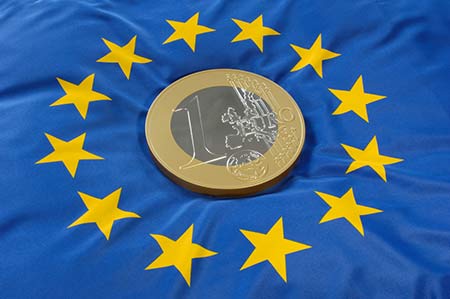The Pound Sterling to Euro (GBP/EUR) exchange rate was continuing to trade in the 1.40 region on Thursday as worries over Greece were heightened after the European Central Bank (ECB) warned that the risk of a default has increased sharply.
The Pound Sterling to Euro (GBP/EUR) Exchange Rate Was Trading In The Region Of 1.4000
Earlier in the session, the Euro pushed higher against the Pound as it continued to receive support from optimistic comments from Greek Prime Minister Alexis Tsipras.
The currency received further support from the release of positive GDP data from Spain.
Tsipras said on Wednesday that a deal with Greece’s creditors was close and government officials said that an agreement was being drafted.
The comments for some reason caused investors to grow optimistic, despite creditors making it clear that they did not share such optimism. Some openly declared that the Greek comments were nonsense.
German Finance Minister Wolfgang Schauble said that the talks have not progressed far and admitted that he was surprised when he heard that the Greek government was claiming that a deal was imminent.
Greece must pay June’s public sector wages and pension bills in a few days, and then has to repay €305m to the International Monetary Fund (IMF) next Friday.
Spanish Data Aids Euro Exchange Rate
Data out of Spain meanwhile showed that economic growth in the nation accelerated in the first quarter of 2015. GDP grew by 0.9% on a quarterly basis and by 2.7% year-on-year.
Retail sales were also shown to have jumped sharply in April. Sales rose from March’s number of 0.2% to 1.3%.
Retail sales climbed a seasonally and calendar-adjusted 4.0% year-over-year in April, faster than March’s 3.2% hike. Economists had expected the growth to ease to 2.6%.
Other data out of the Eurozone showed that sentiment across the region matched economist expectations.
ECB Warns of Greek Default
The ECB released its latest financial stability review and made it makes for grim reading. As well as warning that a Greek default is likely the report also contains charts, which show just how badly the Eurozone has performed against the US and UK since the Euro crisis began.
‘Sovereign risks emanating from Greece, in particular, have increased sharply owing to heightened to political uncertainty over the past six months, while the banking sector in Greece has witnessed substantial deposit outflows, a loss of access to the wholesale funding market and deteriorating asset quality. Financial market reactions to the developments in Greece have been muted to date, but in the absence of a quick agreement on structural implementation needs, the risk of an upward adjustment of the risk premia demanded on vulnerable euro area sovereigns could materialise,’ the ECB said in its report.
Despite the ECB’s warning, the Pound Sterling was under pressure against the Euro and other major peers after data showed that the rate of economic growth in the UK in the first quarter was unchanged from earlier estimates.
According to the Office for National Statistics (ONS) second estimate of GDP, the UK economy expanded by 0.3% in the first quarter.



